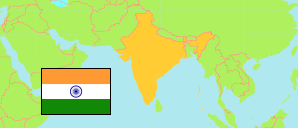
Arunachal Pradesh
Estado federado in India
Contents: Subdivision
The population development in Arunachal Pradesh as well as related information and services (Wikipedia, Google, images).
| Name | Status | Population Census 1991-03-01 | Population Census 2001-03-01 | Population Census 2011-03-01 | |
|---|---|---|---|---|---|
| Arunachal Pradesh | Estado federado | 864,558 | 1,097,968 | 1,383,727 | |
| Anjaw | District | 17,188 | 18,536 | 21,167 | → |
| Changlang | District | 95,530 | 125,422 | 148,226 | → |
| Dibang Valley (Upper Dibang Valley) | District | 6,181 | 7,272 | 8,004 | → |
| East Kameng | District | ... | ... | 63,332 | → |
| East Siang | District | ... | 62,950 | 70,956 | → |
| Kamle (← Lower Subansiri) | District | ... | 10,898 | 15,279 | → |
| Kra Daadi (← Kurung Kumey) | District | ... | 17,842 | 46,704 | → |
| Kurung Kumey | District | ... | 24,676 | 45,372 | → |
| Lepa Rada (← West Siang) | District | ... | 19,474 | 20,152 | → |
| Lohit | District | ... | 42,833 | 49,776 | → |
| Longding (← Tirap) | District | ... | 51,022 | 56,953 | → |
| Lower Dibang Valley | District | 36,888 | 50,448 | 54,080 | → |
| Lower Siang (← West Siang & East Siang) | District | ... | 21,596 | 22,630 | → |
| Lower Subansiri | District | ... | 44,828 | 67,751 | → |
| Namsai (← Lohit) | District | ... | 82,158 | 95,950 | → |
| Pakke-Kessang (← East Kameng) | District | ... | ... | 15,358 | → |
| Papum Pare | District | 72,811 | 122,003 | 176,573 | → |
| Shi Yomi (← West Siang) | District | ... | 10,269 | 13,310 | → |
| Siang (← West Siang & East Siang) | District | ... | ... | 31,920 | → |
| Tawang | District | 28,287 | 38,924 | 49,977 | → |
| Tirap | District | ... | 49,304 | 55,022 | → |
| Upper Siang | District | 27,779 | 33,363 | 35,320 | → |
| Upper Subansiri | District | 50,086 | 55,346 | 83,448 | → |
| West Kameng | District | 56,421 | 74,599 | 83,947 | → |
| West Siang | District | ... | ... | 52,520 | → |
| Bhārat [India] | Republic | 846,387,888 | 1,028,737,436 | 1,210,854,977 |
Source: Office of the Registrar General and Census Commissioner, Delimitation Commission of India.
Explanation: Districts in the boundaries of 2023. Population figures of new delimitated districts are computed by using subdistricts or villages in the boundaries of 2011. Thus, slight deviatiations from the actual population are possible in some cases. Area figures of new delimitated districts are derived from geospatial data.
Further information about the population structure:
| Gender (C 2011) | |
|---|---|
| males | 713,912 |
| females | 669,815 |
| Urbanization (C 2011) | |
|---|---|
| rural | 1,066,358 |
| urban | 317,369 |
| Population Group (C 2011) | |
|---|---|
| »Scheduled Tribes« | 951,821 |
| not indigenous | 431,906 |
| Literacy (A7+) (C 2011) | |
|---|---|
| yes | 766,005 |
| no | 1,023,256 |
| Age Groups (C 2011) | |
|---|---|
| 0-6 years | 212,188 |
| 7+ years | 1,171,539 |